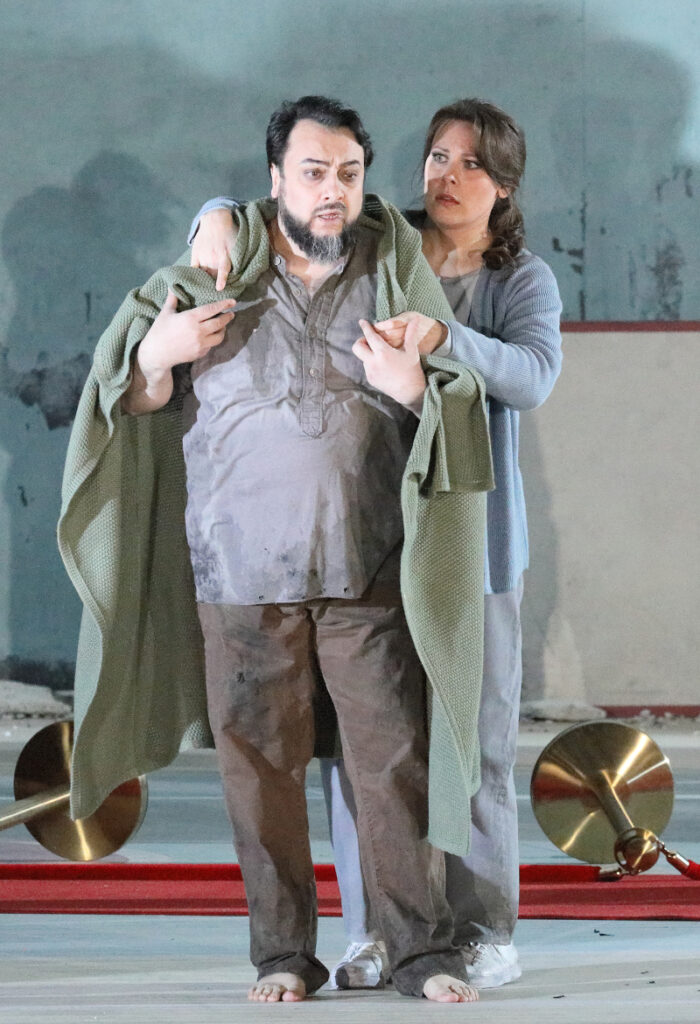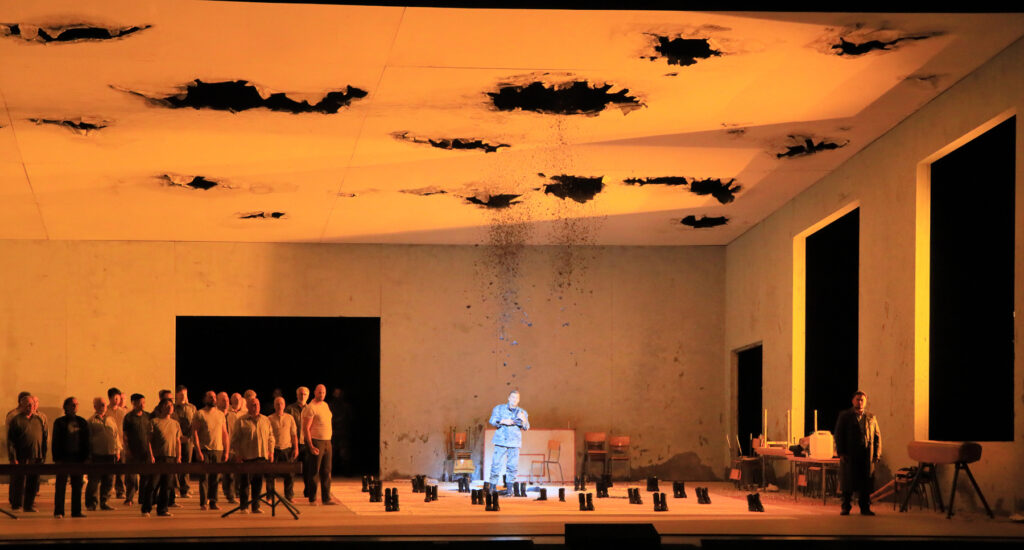Aida, an opera that requires at least five fine Verdi voices, has fallen on hard times. Still, the cast announced for last Saturday’s performance at the Bayerische Staatsoper, headed by tenor Jonas Kaufmann, seemed promising.
Decades into a magnificent career, Kaufmann’s Radamès remains an impressive achievement. On the night I attended, to be sure, he seemed to husband his vocal resources carefully through the first two acts, singing without much of the tenorial squillo (penetrating metallic ring) normally expected in this role. Through the last act, he crooned—a tendency to which he sticks stubbornly in the face of criticism.
Yet he came through where Radamès must. Who else could sing the hushed rising phrase of “Celeste Aida” in a single smoothly restrained legato arc, or pass from the bridge to the second verse on a single breath, or deliver the final note with the quietly dying (“morendo”) tone Verdi specified? And in the heroic moments—notably his stentorian surrender to the priests that ends Act III—Kaufmann delivered a full-throated Italianate sound. Perhaps this unevenness results from too many performances of La Gioconda this month. Overall, nonetheless, Kaufmann showed clearly why he remains the only tenor today whom most opera lovers would go out of their way to hear sing this role.

The most consistent overall performance was Vitalij Kowaljow’s Ramfis (the High Priest). This veteran Ukrainian bass enjoys an active career across the globe, including two decades at the Met, this season as Timur. His tightly focused tone—evenly produced from top to bottom, but with real edge—punched through the orchestra to dark and menacing effect, as befits his role (augmented in this production) as the bad guy.
Geneva-born mezzo-soprano Eve-Maud Hubeaux brings much to the role of Amneris: soprano-like high notes of both subtlety and power, as well as massive low ones produced with a booming chest voice that she turns on and off like an automotive turbocharger. In between, however, the voice (at least the night I heard her) tended to lose focus and recede out of earshot or intelligibility, a serious disadvantage in projecting such a combative character, especially in the all-or-nothing Judgement Scene.
Amonasro is a short but impactful role that long tempted great Italian baritones of the Golden Age to compete in delivering the absolute maximum of dark resonance and vocal heft. The elegant Romanian baritone George Petean intelligently compensates for not quite possessing either quality by phrasing intelligently. His subtle rendering of Amonasro’s opening line (“Sua padre”) first conveys power, then guile, and his plot-turning curse of Aida as “the Pharoah’s slave,” almost yelled rather than sung, was credibly enough to change her mind.
That leaves the rendition of the title role by Russian soprano Elena Guseva. Her full dramatic sound is part of what every Aida needs and makes for many exciting moments. At times, she slims the voice down to capture Aida’s more lyrical musical personality, for example in the pianissimo falling fifths at the end of “Qui Radamès verrà.” Elsewhere, however, such focus eludes her and she sounds more like a second Amneris, rather than the contrasting vocal type the score demands. To be fair, the night I attended, after surmounting a somewhat rocky “O Patria Mia,” she seemed to relax and sang with greater freedom and security, as well as more vocal evenness, through the final curtain.

Three younger singers—bass Alexandros Stavrakakis as the King, Granit Musliu as a Messenger, and Seonwoo Lee as the Priestess—offered creditable performances, while the Bayerischer Staatsopernchor displayed both a burly sound and admirable restraint at appropriate moments. Marco Armiliato conducted with his customary brash gusto: an exciting night, but one in which the orchestra often covered over the singers. The Bayerisches Staatsorchester responded magnificently, if not in the most Italianate manner.
Stage director Damiano Michieletto’s claims that when he stages opera, he always keeps in mind the simple virtues of his grandfather, who used to sing along with Verdi in his Veneto workshop. It is hard to know what his nonno would have made of his grandson’s production of Aida, in which the Temple Scene has no temple, the Nile Scene no Nile, the Tomb Scene no tomb, and the Triumphal scene no triumph—let alone an elephant. Instead, we get a drab unit set with a war-damaged roof, slowly being buried in a rising pile of black ash until it envelops the whole stage. Within this static and plain structure, people stumble about glumly coping with food shortages, dead babies, injured soldiers, dysfunctional schools, and other horrors of war.
Bleak concept productions have long since become dull routine at the Bayerische Staatsoper, where every other new production seems to be a dystopic vision constructed out of Hollywood mimes. (The same is now increasingly true elsewhere, for example in Covent Garden’s new production of this opera.) Michieletto message is equally pat: cultural difference triggers war, which causes human suffering. His 12-page interview in the program book earnestly elaborates this thin and conventional opinion, with no mention of (or evident relevance to) the action of Verdi’s Aida beyond the obvious point that it is a wartime drama. For the less intellectually inclined, he conveys the point by suddenly interrupting the Triumphal Scene with an awkwardly lowered scrim, on which a little film of wartime atrocities is projected. (The more conventional premise that war is manipulated by priestly elite—much sounder, in part because at least it appears in the libretto—receives a few (though telling) references in the final two scenes.)
No matter how unobjectionable Micheletto’s anti-war sentiments may be, indulging them in this opera comes at a high cost. Aside from being dull and conventional, it creates a permanent distraction from the most profound source of emotional connection an opera can offer: music. What distinguishes great composers is not simply the sheer beauty of that music, but its ability to express sentiments that cannot be expressed otherwise. This is often most evident in moments without clear stage action, where the music conveys some element of a character’s interior life: a distant memory, a deeper motivation, an existential predicament, or a cultural identity.
Michieletto, by contrast, treats such moments of dramatic repose as dead space begging to be filled with fussy stage action. So, Verdi’s delicately exotic prelude serves as background music for children playing with toys and Aida tidying up a gymnasium. “O Patria Mia”—a supreme challenge for the soprano voice that also expresses impressions of the distinctive homeland that compels her to betray her lover—is exploited as accompaniment for a little girl excavating a grave. The ironic, yet magical moment when Amonasro’s (insincere) plea for mercy is taken up by the (sincere) Egyptian people—a musical encoding of Verdi’s own anti-war message—passes almost unnoticed after twenty minutes of relentless anti-war propaganda. And, in the final scene, Radamès and Aida’s disembodied voices arising from an Egyptian tomb become a dreamy Felliniesque picnic scene populated by individuals playing peasant music and holding pastel balloons.
The audience at the premiere last year was reported to have booed Michieletto’s excesses. For me, his distractions had the unfortunate psychological effect of reducing Verdi’s great operatic music to the equivalent of a film score. I spent much of the night staring at the back of the seat in front of me, and enjoyed the performance much more when I did. I would like to think his nonno would have been grumpy as well.
Andrew Moravcsik
Aida
Music composed by Giuseppe Verdi
Libretto by Antonio Ghislanzoni
Cast and production staff:
Elena Guseva – Aida; Eva-Maud Hubeaux – Amneris; Jonas Kaufmann – Radamès; Vitalij Kowaljow – Ramfis; George Petean – Amonasro; The King – Alexandros Stavrakakis; A Messenger – Granit Musliu; A Priestess – Seonwoo Lee.
Bayerische Staatsoper. Marco Armiliato – Conductor. Damiano Michieletto – Director. Paolo Fantin – Scenery . Bayerisches Staatsorchester. Bayerischer Statsopernchor.
21 April 2024
München
Top image: Jonas Kaufmann as Radamès
All photos © Wilfried Hösl courtesy of Bayerischen Staatsoper.